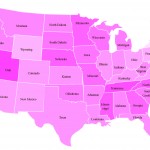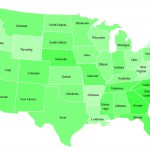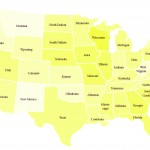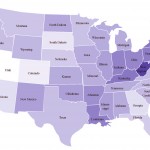Utah was found in a recent study to be the number-one most agreeable state and the least neurotic place in the country, confirming that Mormons may be as nice as we think we are.
The 13-year study, published in the Journal of Personality and Social Psychology, gathered 1.6 million data response surveys from 48 states and concluded that lines could be drawn in the U.S. based on the personality of a region.
Large samples of people from across the states took the “Big Five” personality test based on extroversion, agreeability, neuroticism, openness and conscientiousness.
The study stated, “Our approach to addressing this issue provides an entirely novel perspective on geographical personality differences. Our approach challenges the standards methods of dividing up the country.”
The map of the U.S. had three main clusters. The West was characterized as “relaxed and creative,” the Midwest was labeled “friendly and conventional,” and the East Coast was described as “temperamental and uninhibited.”
Bob Ridge, a social psychology professor at BYU, said these personality traits help give key insights into individual and community behavior.
“Agreeableness is a tendency to be compassionate and cooperative,” Ridge said, “while neuroticism measures emotional stability and impulse control.”
Commenting on the theory of the study instead of the methodology, Ridge said Utahns can look to their past to help explain these results.
“People that live in Utah tend to be cooperative rather than antagonistic,” Ridge said. “I think you can trace that to the original pioneer ethic and is also consistent with the values of Christianity.”
Ridge said people in Utah are emotionally stable, and there are many environmental factors that offer insights into why.
“One could theorize that comes from the value system and Christian teachings,” Ridge said. “Those Christian values are passed down from generation to generation.”
To help explain the phenomena that people who are alike tend to cluster together, Ridge said similarity is the key issue.
“People like similarity and like people who like them,” Ridge said. “Although we claim to like diversity, research shows we are more likely to choose to live by people like ourselves.”
People ideologically support diversity but feel more comfortable around others who reflect them and will ultimately settle in those communities. Ridge said the ranking of high agreeableness and low neuroticism is a very favorable description of the people who live in Utah.
Sam A. Hardy, an assistant professor in the psychology department, said two things can help explain why the country can be segmented regionally based on shared personality characteristics.
“One is that their personality predisposed them to pick a place to live,” Hardy said. “But also certain cultures of places influence lifestyle and personality.”
Over time, people become more and more similar to one another, Hardy said, but something about Utah’s culture is unique from the rest of the country.
“We’re a more highly religious state,” Hardy said. “So the high agreeableness could be a product of high religiosity.”
Hardy also said Utah is fairly homogeneous across race, religion and politics, and those factors could help account for the results of the study.
“If agreeableness is getting along, then it’s probably easier to get along when we are all the same,” Hardy said.
Research also shows Utah is the top state in anti-depressant drug use, Hardy said.
The study reported the implications of the findings could greatly influence people’s understanding of regional health disparities, cultural diversity and economic indicators.
West Virginia was decidedly the most neurotic state, while Washington, D.C., was found to be the least agreeable but also the most open place in the country.
To take the test and find out which state matches your personality best, visit time.com









